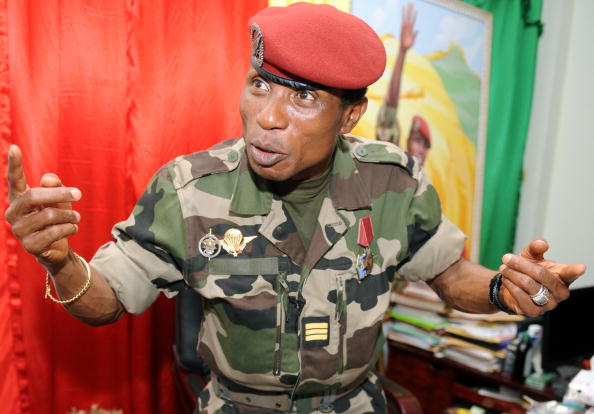Conakry – A Guinean court trying suspects in a 2009 massacre on Monday threw out a bid by former dictator Moussa Dadis Camara to be detained under house arrest and ordered him to be held in custody.
Camara and 10 other former military and government officials are accused over the killing of 156 people and the rape of at least 109 women by pro-junta forces at a political rally in a Conakry stadium in September 2009.
They face charges ranging from murder to sexual violence, kidnappings, arson and looting, while Camara himself is charged with “personal criminal responsibility and command responsibility”.
The 58-year-old former strongman was detained on September 27, a day before the long-awaited trial began in a purpose-built court in the capital Conakry.
Africanews | “Historical moment” as Guinea stadium massacre trial opens in Conakry https://t.co/ZrqcHQJQVb
— J.-P. Janson De Couët (@jpjanson) October 9, 2022
He had returned to the West African state only a few days before after living in exile in Burkina Faso.
Defence attorneys last Tuesday had asked the court for Camara to be released from custody or placed under house arrest during the proceedings, in line with the “respect” due to a former head of state.
They also said another leading defendant, Lieutenant Aboubacar Sidiki Diakite, who was former head of Camara’s bodyguard, was too ill to face trial and needed medical treatment abroad.
But Judge Ibrahima Sory Tounkara rejected these petitions and ruled that the proceedings could get fully underway.
In Camara’s case, house arrest could only be offered to foreign defendants, and in Diakite’s case, “he did not submit any medical certificate to support his release on the grounds of ill health”, the judge said.
ALSO READ | Guinea opposition spurns talks with junta
Camara, at the time an unknown captain in the army, seized power in December 2008 shortly after the death of Guinea’s second post-independence president, General Lansana Conte, who had ruled for 24 years.
In December 2009, Camara was wounded in the head in an attempted assassination and headed to Morocco for medical treatment.
He fled into exile in Burkina Faso, where he was indicted in July 2015 by Guinean magistrates for his alleged role in the stadium massacre.
Follow African Insider on Facebook, Twitter and Instagram
Source: AFP
Picture: Getty Images
For more African news, visit Africaninsider.com


